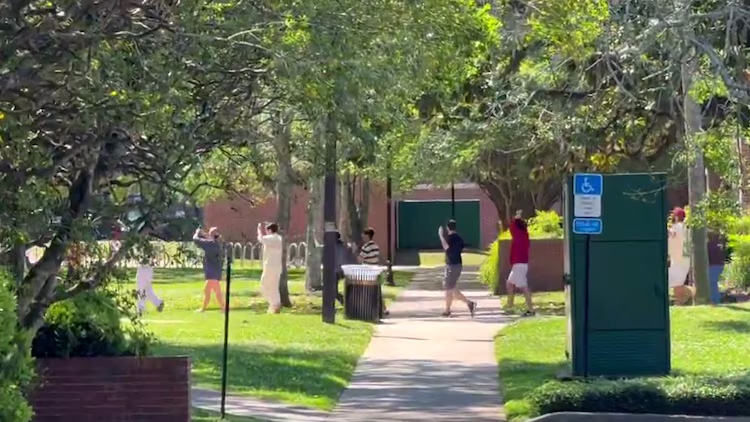New York City sues for-profit Berkeley College over alleged deceptive practices


NEW YORK CITY (WABC) -- The Department of Consumer Affairs on Friday filed civil charges alleging deceptive and predatory practices against Berkeley College, a for-profit school that enrolls 3,500 students in New York state and has campuses in New York and New Jersey.
The lawsuit claims that Berkeley College misleads incoming students about their curriculum and that its $12,950 per-semester tuition frequently results in graduates being significantly in debt.
That tuition is compared to $3,685 per semester at CUNY, yet Berkeley spends less than half of what CUNY does for instruction.
Any consumer who believes they may have experienced any wrongdoing by Berkeley is urged to contact the agency by calling 311 or by filing a complaint at NYC.gov/dca.
"For-profit colleges are businesses, and like most businesses, their top priority is generating profits," Department of Consumer Affairs Commissioner Lorelei Salas said. "Our investigation into Berkeley College reveals that their recruiters appear to say whatever they think a prospective student wants to hear, especially when it comes to academic programs, employment, transfer credits, and federal student loans -- regardless of the truth -- to convince them to enroll. These aggressive recruiting tactics are designed to prey on the hopes and dreams of consumers seeking improved career prospects and greater financial security to better care for themselves and their families."
The lawsuit follows a nearly two-year investigation and included a lengthy battle over subpoenas that were issued to Berkeley. It was filed after dozens of interviews with current, prospective and former students; undercover operations; extensive research; and review of thousands of pages of documentation from Berkeley.
Officials say it reveals that Berkeley engages in aggressive recruiting and debt collection tactics, luring consumers -- many of whom are people of color and first-generation college students with low incomes -- to one-on-one sales pitches where they deceive them about potential financial obligations and say misrepresentations about other higher education institutions.
The lawsuit alleges, among other things, that Berkeley's deception includes:
--Misleading students about financial aid, including federal financial aid: Berkeley recruiters pretend to advocate on behalf of prospective students, promising to help them and their families understand their financial options. The investigation found that these recruiters often misrepresent the facts about a potential students' rights and obligations regarding financial aid, including how federal student loans work.
--Tricking students into taking out loans directly from Berkeley: In addition to tricking students into taking out federal student loans, school representatives also bind students to Institutional Loans -- loans directly from Berkeley -- that are deceptively referred to as "payment plans." Berkeley representatives block students from paying tuition any other way, even refusing to let students pay tuition balances up front, instead steering them into a payment plan.
--Deceiving students about institutional grants: While Berkeley vigorously promotes its grants (which do not need to be repaid) to lure new students, they fail to disclose that the institutional grants require students to borrow the maximum amount of loans available to the student through the federal government before Berkeley will award such a grant.
--Deceiving students about transfer credits, majors, and careers: Recruiters are dishonest about employment prospects and transfer credits, sometimes going so far as to guarantee post-graduation employment. One recruiter told an undercover DCA inspector that "96 percent of our students graduate and are employed once they graduate," when in reality Berkeley's graduation rate is only 29 percent. Students have also been deceived about the transferability of credits, sometimes resulting in increased enrollment periods.
--Violating local debt collection laws by concealing its identity from former students when collecting debt, including debt that is not owed: The city's debt collection rules prohibit Berkeley from using any name other than its own to collect debt. And yet when Berkeley sends invoices to student who are believed to owe money, it does not identify itself as "Berkeley," but rather as "BES, Inc." Furthermore, the investigation found that Berkeley pursues its graduates, seeking payments for debts not owed. In one case, Berkeley refused to release a graduate's diploma to him because he allegedly owed the school over $3,000 -- even though he was previously told that he graduated owing nothing.
Berkeley College issued the following statement to Eyewitness News:
Berkeley College vigorously denies the allegations contained in the DCA's lawsuit and denies that it has done anything to violate the New York City Consumer Protection Law. Berkeley College will vigorously defend the College against the DCA's accusations. Berkeley College repeatedly sought the opportunity to review any allegations with the DCA. However, DCA officials denied requests to discuss the claims before they pursued this action.
The New York City DCA first subpoenaed the College in February 2015 and the DCA subsequently withdrew its subpoena.
Berkeley College has sought to cooperate with the DCA and has provided more than 52,000 pages of documentation in accordance with the DCA's requests.
Berkeley College was founded in New York in 1936. This year, Berkeley College New York received its reaffirmation of accreditation by the Middle States Commission on Higher Education, the regional accrediting body of top colleges and universities in New York State. In 2017 Berkeley College New York was cited by the Income Mobility Report Card for being in the top one percent of colleges that help increase income mobility among graduates.
Berkeley College has an 87-year history of serving students in the New York metropolitan area under the highest principles. We are proud of our many accomplishments and accolades including those of our students and more than 60,000 alumni whose success has always been our primary concern.
The Department of Consumer Affairs offers the following tips to help plan and protect students when applying to schools:
--Research. Research multiple schools before deciding which one is right for you. Ask for information on student loan debt, total costs, and whether the credits you get will transfer to other schools. Be sure to research the school's credentials, especially if the career you are seeking requires a license, such as a nursing assistant or teacher.
--Ask for the school's tuition cancellation policy in writing. The policy should describe how you can get a refund if you need to cancel or withdraw.
--Never sign anything you don't understand. If a school pressures you to sign a contract or agreement on the spot, walk away. You have the right to bring home important documents so you can read them more carefully with people you trust.
--Complete the Free Application for Federal Student Aid (FAFSA). The FAFSA is the first step in the financial aid process and is the application students use to apply for federal grants and federal student loans. In New York State, it is also a requirement for receiving a grant from the New York State Tuition Assistance Program (TAP). Many types of financial aid are distributed on a first-come, first-served basis, so it's to your advantage to file as early as possible. Check with colleges and file in time to meet the earliest deadline. You must complete the FAFSA form every school year. Visit Studentaid.ed.gov for information about FAFSA.
--Be wary of taking on significant amounts of debt. Some schools charge tens of thousands of dollars per semester. Often, the "financial aid package" that is available isn't free money, but rather loans you must pay back with interest. Make sure you understand the terms, consider the projected salary associated with your education, and whether you will be able to make the projected payments. New Yorkers can also book a free and confidential appointment with a professional financial counselor at one of the City's Financial Empowerment Centers by calling 311, visiting nyc.gov/dca, or texting TalkMoney to 42033 (message and data rates may apply; check with your service provider).
--Do research before borrowing money. If you need to borrow money for school, always consider federal assistance programs, state assistance programs, scholarships and opportunity programs that offer assistance with books and fees before private lenders.
--Avoid schools that guarantee employment after you graduate. A school cannot guarantee that you'll get a job when you graduate. Many times, the schools that make these types of promises don't actually place you in a job.
----------






